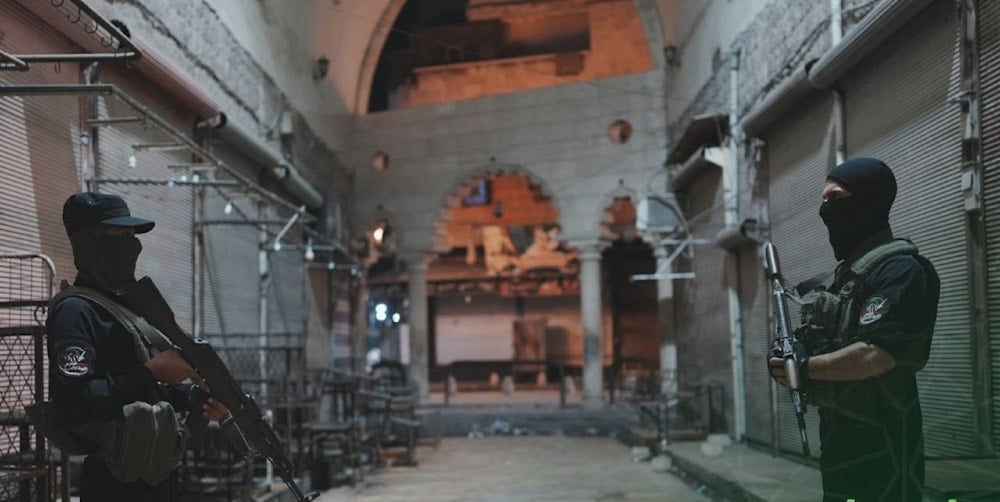Tensions spiraling in Syria's northern Aleppo between factions
Tensions are growing within illegitimate factions in Syria, leading to internal conflicts and civilians are bearing the brunt of the situation.
-

Armed Jabha Shamiyya fighters in an undated photo in Azaz, north Syria (Social media)
Disagreements between al-Jabaha al-Shamiyya and the head of the Syrian opposition's Coalition Government, Abdul Rahman Mustafa, have come to light after Mustafa filed a complaint with the Turkish intelligence accusing the faction of obstructing the opening of the Abu al-Zandin crossing, located north of the city of al-Bab, in northern Aleppo.
According to opposition sources, Mustafa addressed the issue during a meeting in Gaziantep, Turkey, which included Turkish officials, leaders from his self-proclaimed government, and commanders from the Syrian National Army.
During the meeting, Mustafa reportedly criticized the chaotic actions of al-Jabha al-Shamiya in northern Aleppo, accusing the faction of undermining the self-proclaimed government, inciting the local population against it, and attacking the self-proclaimed government offices.
The sources also noted that Mustafa hinted at possible cooperation between some leaders of al-Jabha al-Shamiya and Hayat Tahrir al-Sham to destabilize northern Aleppo. The ultimate goal of these actions, according to Mustafa, was to retaliate against the illegitimate government and prevent the opening of the Abu al-Zandin crossing, which could alleviate some of the hardships faced by local residents.
In response, al-Jabha al-Shamiya issued a statement announcing the suspension of its cooperation with the government until a vote of no confidence was passed against Mustafa and he was referred to the judiciary for alleged misconduct. The faction claimed Mustafa had acted with unprecedented hostility and insulted the group and the Eastern Factions during the meeting.
Al-Jabha al-Shamiya further stated that Mustafa was intentionally undermining them and misrepresenting their goals, citing a proposal they made to withdraw legitimacy from his government due to its failure to address the demands of the Syrian street.
Spiraling tensions
Tensions between the two parties were exacerbated after Imam Sheikh Mahmoud al-Jaber of the Ali Mosque in the city of Azaz revealed that Mustafa had blamed al-Jabha al-Shamiya for the recent unrest in Azaz, including the failure to protect the self-proclaimed government offices, institutions, and Turkish vehicles during the chaos.
Locals have attributed the ongoing conflicts between the faction and the illegitimate government to power struggles over territorial control and authority distribution. They pointed out that al-Jabha al-Shamiya had, at times, attempted to impose military dominance over certain areas, conflicting with the government's desire for political and administrative control.
Financial and logistical resources have also been a major source of contention, with both al-Jabha al-Shamiya and the cabinet vying for financial support from backers like Turkey, influencing how resources are distributed on the ground.
The city of al-Bab recently saw significant unrest following attempts to reopen the Abu al-Zandin crossing, which links territories held by Turkish-backed factions and areas controlled by the Syrian army. Protests led by al-Jabha al-Shamiya erupted in mid-August, with hundreds of residents opposing the move without concessions that would meet their demands.
The situation further deteriorated when the crossing was closed again after unidentified projectiles targeted the area. Armed groups subsequently blocked the passage of commercial trucks through the crossing, threatening to use force despite the presence of Turkish military police.
Locals believe that al-Jabha al-Shamiya's opposition to the opening of Abu al-Zandin is motivated by its desire to maintain influence in the region and use the crossing to leverage its interests.
Neither the Turkey-based Syrian National Coalition nor the so-called Syrian Interim Government has issued statements regarding the growing rift. Observers warn that these tensions could lead Ankara to intervene to prevent an escalation in its sphere of influence, which could jeopardize its negotiating position with the Syrian government.
Abu al-Zandin crossing shelled
The Abu al-Zandin crossing was subjected to intense shelling of unknown origin less than 24 hours after its opening in August.
An Al Mayadeen correspondent noted that sources close to the armed militia groups confirmed that "fighters from Ahrar al-Sham, allied with Hayat Tahrir al-Sham and known as Ahrar Oulan, were responsible for the shelling with mortar and artillery fire."
This shelling appears to be an attempt to prevent the commercial opening of the crossing and to block the implementation of the Russian-Turkish agreement, which aims to open commercial and humanitarian crossings linking areas controlled by armed militia groups with areas under Syrian government authority.
The decision to open the crossing, which connects areas controlled by the "National Army" otherwise known as the Free Syrian Army, with areas under Syrian government authority, was made two months ago following a Russian-Turkish agreement coordinated with Damascus. However, protests by some armed militias prevented its opening.
In June, the Turkish army forced one of the armed factions it supports to repair the Abu al-Zandin crossing after it had been damaged and its contents destroyed during an attack aimed at preventing its reopening towards Syrian government-liberated areas.
This agreement comes amid Russia's ongoing efforts to restore relations between Ankara and Damascus. The Russian Foreign Ministry announced in early August that Moscow is prepared to host a meeting between Syrian President Bashar al-Assad and Turkish President Recep Tayyip Erdogan.

 5 Min Read
5 Min Read








